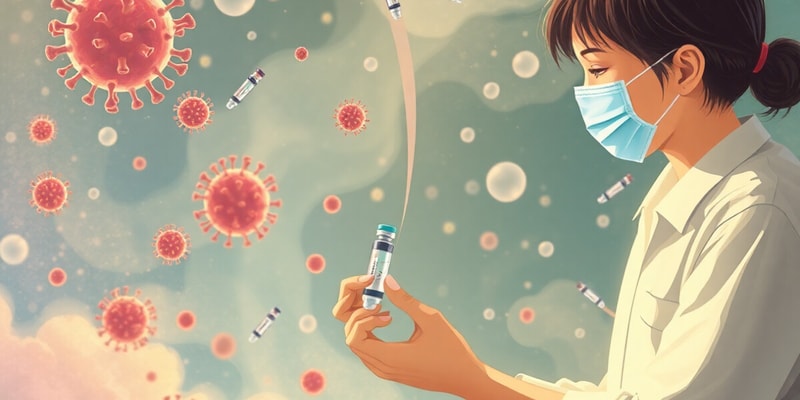Podcast
Questions and Answers
What is a significant challenge associated with developing effective vaccines for Dengue?
What is a significant challenge associated with developing effective vaccines for Dengue?
What aspect of the immune response is particularly critical for the vaccine development against SARS?
What aspect of the immune response is particularly critical for the vaccine development against SARS?
The main reason early vaccines for Staphylococci were ineffective is due to what?
The main reason early vaccines for Staphylococci were ineffective is due to what?
What is considered a major issue in vaccine development for Trypanosomiasis?
What is considered a major issue in vaccine development for Trypanosomiasis?
Signup and view all the answers
What challenge is shared among both Chlamydia spp. and Candida spp. in terms of vaccination?
What challenge is shared among both Chlamydia spp. and Candida spp. in terms of vaccination?
Signup and view all the answers
What role do T regulatory (T reg) cells play in immunological tolerance?
What role do T regulatory (T reg) cells play in immunological tolerance?
Signup and view all the answers
Which of the following correctly describes a characteristic of the poliovirus?
Which of the following correctly describes a characteristic of the poliovirus?
Signup and view all the answers
What is a specific disadvantage associated with subunit vaccines?
What is a specific disadvantage associated with subunit vaccines?
Signup and view all the answers
Which type of vaccine aims to replicate a natural infection without causing the disease itself?
Which type of vaccine aims to replicate a natural infection without causing the disease itself?
Signup and view all the answers
What is a major challenge in developing a vaccine for HIV?
What is a major challenge in developing a vaccine for HIV?
Signup and view all the answers
Study Notes
Tolerance
- Tolerance is a state of non-reaction to foreign antigens
- Barriers, such as compartmentalization, play a role in maintaining tolerance
- T regulatory cells (T regs) produce immunosuppressive cytokines like IL-10, TGF-beta, and IL-35, contributing to immune homeostasis
Immunological Tolerance
- Acquired immunity is achieved through exposure to antigens
- Examples of acquired immunity include tetanus, hepatitis B, and rabies
Polio
- Polio is caused by three strains of the poliovirus, spread through fecal-oral transmission
- Most infections are mild
- In a small percentage of cases, the virus invades motor neurons, causing irreversible paralysis
Polio Vaccines
- Inactivated polio vaccine (IPV) is administered via injection and contains inactivated poliovirus
- Oral polio vaccine (OPV) contains live, attenuated poliovirus and is administered orally
Vaccines
- Vaccines aim to replicate natural infection without causing disease
- Subunit vaccines contain a specific component of the pathogen, like a protein or carbohydrate
- Toxoid vaccines contain inactivated toxins produced by the pathogen
- Conjugate vaccines combine a weak antigen with a strong one to enhance the immune response
- Inactivated whole vaccines contain killed pathogens
- Live attenuated vaccines contain weakened, live pathogens
- Problems with subunit/killed vaccines: May require multiple doses and booster shots to achieve adequate immunity
- Boosters provide an additional dose of vaccine to maintain immunity over time
- Problems with live vaccines: - Risk of reversion to a virulent form, Minimal effectiveness in individuals with weakened immune systems
mRNA vaccines
- Pfizer and Moderna vaccines use mRNA technology to deliver genetic code for the spike protein of SARS-CoV-2.
- Oxford/AstraZeneca vaccine uses a viral vector (a modified adenovirus) to deliver the genetic code.
Dangers Associated with Vaccines
- Vaccines are generally safe, but can cause mild side effects like pain or swelling at the injection site
- Rare allergic reactions can occur
- Some vaccines may be contraindicated in people with certain medical conditions
Vaccines for Oral Diseases
- Caries: Vaccines targeting Streptococcus mutans are in development
- Periodontal disease: Vaccines targeting periodontal bacteria are in clinical trials
- HPV: HPV vaccine prevents infection with certain HPV types, reducing the risk of cervical, oral, and anal cancers
- Cervical cancer: HPV vaccines are highly effective in preventing cervical cancer
- Oropharyngeal cancer: HPV vaccines contribute to reducing the incidence of oropharyngeal cancer
- Gardasil is an HPV vaccine that protects against multiple HPV types.
Issues with HPV Vaccination
- Some individuals have concerns about the safety or effectiveness of HPV vaccines.
UK Immunization Schedule
- The UK has a comprehensive immunization schedule for children, including vaccines for polio, measles, mumps, rubella, and other infectious diseases.
Major Diseases with No Vaccine
- HIV
- Herpes Virus
- Adenoviruses, Rhinoviruses
- Respiratory Syncytial Virus
- Hepatitis C
- Dengue
- SARS
- West Nile Virus
- Staphylococci
- Group A Streptococci
- Mycobacterium Lepra
- Treponema pallidum
- Chlamydia spp.
- Candida spp.
- Pneumocystis spp.
- Malaria
- Trypanosomiasis
- Leishmaniasis
- Schistosomiasis
- Onchocerciasis
Advances in Vaccine Technology
- DNA vaccines: Use DNA sequences to encode antigens
- Tumour vaccines: Vaccines designed to stimulate the immune system to target and destroy tumor cells
Tumour Vaccines
- Tumour vaccines hold the potential for treating and preventing cancer.
Studying That Suits You
Use AI to generate personalized quizzes and flashcards to suit your learning preferences.
Related Documents
Description
Explore the critical concepts of immunological tolerance and the essential role of vaccines in disease prevention. This quiz covers the mechanisms of immune tolerance, the impact of T regulatory cells, and details about polio and its vaccination strategies. Test your understanding of acquired immunity and how vaccines work to foster immunity without disease.




